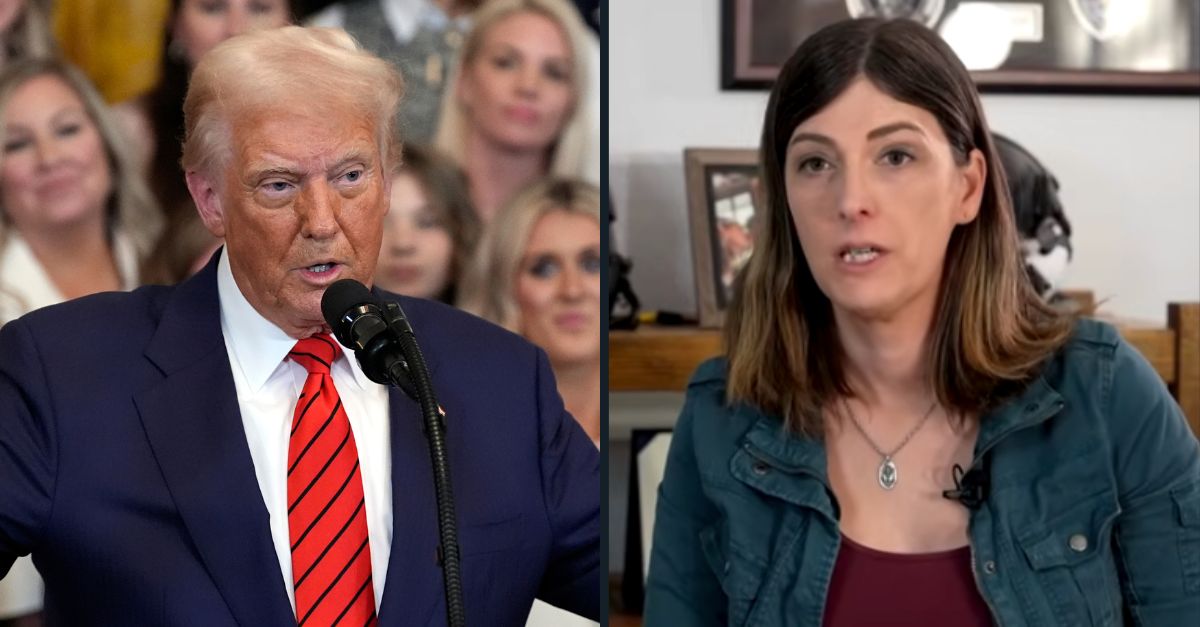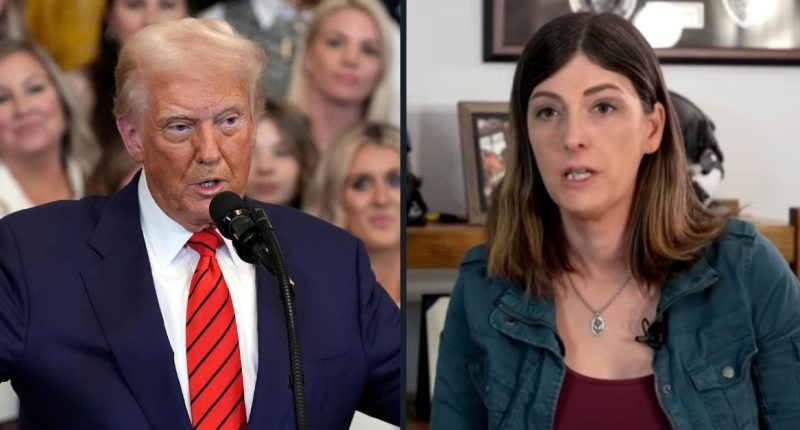
Left: President Donald Trump speaks before signing an executive order barring transgender female athletes from competing in women’s or girls’ sporting events, in the East Room of the White House, Wednesday, Feb. 5, 2025, in Washington (AP Photo/Alex Brandon). Right: Emily Shilling (YouTube/Reuters).
The Trump administration on Thursday asked the U.S. Supreme Court to intervene in a case that would allow the government to enforce President Donald Trump’s policy banning transgender people from serving in the military while legal challenges to the measure unfold in lower courts.
The administration urged the justices to stay a nationwide injunction issued by U.S. District Judge Benjamin Settle, of Washington state, who reason that the policy was “likely unconstitutional” and would result in irreparable harm to the plaintiffs if enforced. Settle emphasized that the government’s “unrelenting reliance” on asking the court to defer to military judgment was “unjustified,” as it had produced no evidence to support the “new judgment” on transgender service reflected in the ban.
That order was upheld by a three-judge appellate panel earlier this month in a tersely-worded single-sentence ruling that provided no reasoning.
In the 39-page emergency petition, Solicitor General D. John Sauer asserted that the district court’s order halting the ban on “individuals who have gender dysphoria” was effectively “usurping the Executive Branch’s authority to determine who may serve in the Nation’s armed forces.”
“[T]he injunction against the 2025 policy irreparably harms the government by forcing it to maintain a policy that the Department has found to be inconsistent with ‘the best interests of the Military Services’ and with ‘the interests of national security,” Sauer wrote. “Absent a stay, the district court’s universal injunction will remain in place for the duration of further review in the Ninth Circuit and in this Court — a period far too long for the military to be forced to maintain a policy that it has determined, in its professional judgment, to be contrary to military readiness and the Nation’s interests.”
The case is Shilling v. Trump and was filed by Cmdr. Emily Shilling, a decorated Navy pilot with over 60 combat missions and experience with high-risk work as a test pilot, on behalf of herself and six actively serving transgender service members.
Should the high court deny the administration’s primary request, Sauer asked that the scope of the district court’s injunction be narrowed to only block implementation of the policy for the seven plaintiffs who are party to the lawsuit.
During his first week in office, Trump signed an executive order stating that the armed forces had been “afflicted with radical gender ideology” that had only been enacted to “appease activists unconcerned with the requirements of military service like physical and mental health, selflessness, and unit cohesion.”
“Beyond the hormonal and surgical medical interventions involved, adoption of a gender identity inconsistent with an individual’s sex conflicts with a soldier’s commitment to an honorable, truthful, and disciplined lifestyle, even in one’s personal life,” the EO states. “A man’s assertion that he is a woman, and his requirement that others honor this falsehood, is not consistent with the humility and selflessness required of a service member.”
Notably, plaintiffs in the Shilling case are represented by attorneys from the law firm of Perkins Coie, which has sued the administration after Trump issued an executive order aimed at kneecapping the firm’s work with the government. It is one of several orders the president has issued against law firms linked to those he perceives as political enemies.
Love true crime? Sign up for our newsletter, The Law&Crime Docket, to get the latest real-life crime stories delivered right to your inbox.






